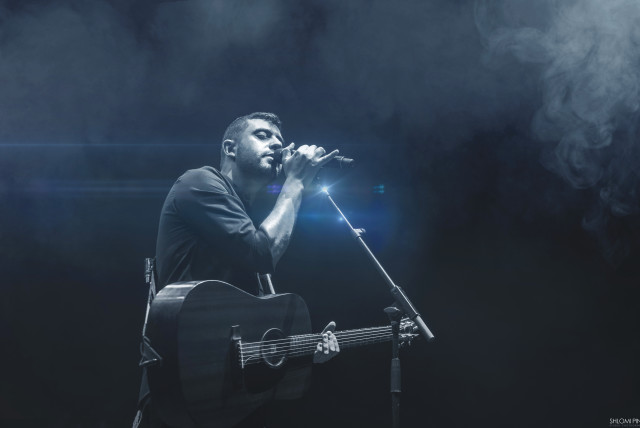Jerusalem's Tzama festival unites through music amid war

In these challenging times, the Tzama Music Festival continues to strengthen connections and elevate spirits through the power of Jewish music.
Jerusalem came alive last Wednesday night as the grand hall at Binyanei Ha’uma hosted an electrifying performance featuring three iconic artists: Avraham Fried, Ishay Ribo, and Amir Dadon.
With a full orchestra, dazzling light displays, lasers, and giant screens, the event, organized by Tzama, was part of a week-long Jewish music festival.
The sold-out Tzama Music Festival, which ends Tuesday, includes 17 concerts over seven days, with up to three performances daily and a total of 80,000 attendees expected.
The festival features a free buffet in the lobby where books on hassidism are on sale.
Wednesday’s public concert was preceded by a private one attended by thousands of soldiers.
Tzama (meaning “thirst” in Hebrew), the brainchild of Rabbi Moshe and Bracha Shilat, is dedicated to spreading hassidut through music and has produced the festival for 15 years.
“Music fills the soul,” Bracha Shilat said. “Not everyone likes to study from texts; the music connects them.” It’s clear that Tzama’s mission has grown far beyond the Shilats’ original efforts, responding to a yearning for healing, connection, and hope.
A concert fit for all
This year, in partnership with the Jerusalem Municipality, the festival offers separate concerts tailored for men, women, and youth.
Fried, the decades-long Chabad crooner was joined by Ribo, the current religious singing star with wide appeal – who is still on a high from his sold-out September Madison Square Garden concert – and Dadon, the “secular” trio member, all blending heartfelt lyrics and soulful charisma to create a powerful evening of unity and inspiration.
Their band consists of brass, string, electric, and percussion instruments ranging from an electric guitar to a Middle Eastern plucked-string kanun.
The concert began with a heartfelt song delivered by Ribo. His twist on hassidic music turned it into pop. The blend of Western instruments – such as the clarinet – paired with more Eastern ones made for a beautiful melding of styles.
The music evolved into an up-tempo song that soon had everyone on their feet dancing. The singer then said an emotional prayer for the safe return of our hostages and soldiers.
Dadon then sang “Yedid Nefesh” (soulmate), a poem sung during Friday night prayers and at the third meal of Shabbat, to an old hassidic niggun (tune) by Rabbi Tzvi Neria, a student of Rav Abraham Isaac Kook. The reaction from the audience was incredible – there wasn’t a single person in sight who wasn’t singing along.
Dadon’s singing was like a roller coaster of emotion hitting all the notes.
Ribo soon joined in for a beautiful duet, his soft falsetto complimenting Dadon’s powerful vocals, producing an exhilarating performance.
A haunting melody performed on clarinet introduced Fried, who captivated the crowd with his uplifting melodies and heartfelt, infectious energy; everyone was dancing and singing. “The crowd was singing every note,” he said humbly, “and that gives the singers wings to fly.”
Fried slowed the pace a bit, giving way to a heart-warming video presenting the story of 37-year-old father of five Shimon Cohen, a reserves soldier injured in Gaza from rocket shrapnel who was providentially able to attend last year’s festival in between battles.
Cohen joined Fried on stage and recited another prayer for the swift return of our soldiers and hostages. The resounding applause was deafening.
“Our fighting in Gaza and Lebanon is for the Nation of Israel to be together,” Cohen said. “Tzama succeeds in achieving this kind of unity.”
Ribo then joined Fried for a duet. It didn’t take long for Dadon to return to the stage, completing the trifecta.
The blend of the three from completely different backgrounds and styles harmonized perfectly, making music that connected us all. It was at this point that we came to appreciate the “thirst” that drew thousands to these events. It wasn’t just the music that drew us, it was also the unity in the audience.
Connected regardless of differences
Everyone who came to the music festival disregarded their differences to connect with their Jewish heritage through music.
The concert produced a sense of profound transformation, unfolding amid Israel’s wars in the South and North.
Families of the hostages were among the attendees, making it an emotional experience for all of Israel, whose collective heart is broken.
It is into this broken heart that the festival pours the light of Torah, hassidism, and the wisdom of our holy people.
In these challenging times, the Tzama Music Festival continues to strengthen connections and elevate spirits through the power of Jewish music.
Jerusalem Post Store
`; document.getElementById("linkPremium").innerHTML = cont; var divWithLink = document.getElementById("premium-link"); if (divWithLink !== null && divWithLink !== 'undefined') { divWithLink.style.border = "solid 1px #cb0f3e"; divWithLink.style.textAlign = "center"; divWithLink.style.marginBottom = "15px"; divWithLink.style.marginTop = "15px"; divWithLink.style.width = "100%"; divWithLink.style.backgroundColor = "#122952"; divWithLink.style.color = "#ffffff"; divWithLink.style.lineHeight = "1.5"; } } (function (v, i) { });

